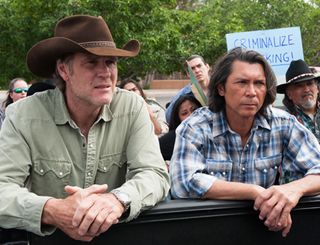Streaming Services Bent on Raising the Dead

When it comes to new comedies, NBC this season has been the Le Creuset cookware network—nothing sticks. In October, it canceled two new fall comedies, Bad Judge and A to Z, and killed another, Mission Control, before it even made it onto the schedule. The retreat continued in November when Netflix announced that it had struck a deal with NBC’s sister studio, Universal Television, to acquire exclusive rights to Unbreakable Kimmy Schmidt, a single-camera half-hour from creators Tina Fey and Robert Carlock originally planned for midseason on the broadcaster. The deal not only saved Kimmy Schmidt from preemptive cancellation but also guaranteed it a healthy lifespan, with Netflix committing to two 13-episode seasons up front.
It also was the latest in a series of moves by digital streaming services to pick up shows cut loose by linear networks. Just one day before the Kimmy Schmidt deal was announced, Netflix ordered a fourth season of contemporary Western drama Longmire, canceled in August by A&E. In June, Yahoo announced that it would be home to a 13-episode sixth season of Community, canceled earlier in the year by NBC, making the single-camera comedy the first original TV-length series of its Yahoo Screen venture. Hulu in recent weeks announced that it would host the remaining episodes of canceled ABC comedies Manhattan Love Story and Selfie.
Those deals have been part of an aggressive push this year by over-the-top services such as Netflix, Amazon, Hulu and emerging players such as Yahoo and Sony’s Crackle to pick up more original programming, much of it from high-profile creators well known in TV and film. Bela Bajaria, executive VP, Universal Television differentiates the Kimmy Schmidt deal from those made for Longmire and Community, but notes that the arrival in the marketplace of streaming services and the increased demand for original programming from cable and broadcast networks has given studios a better chance to extend the lives of their shows.
“It’s not as easy as it probably seems, but at least you know there’s a window,” Bajaria says. “There may be an opportunity to take a show that has merit, quality, a passionate fan base and that can still grow and we can actually keep it alive and continue to produce it somewhere else.” As for what the streaming services get in return, Bajaria says: “They’re buying into, obviously, the already built-in audience and brand of that show.”
Streaming services scooping up a canceled show also have the advantage, in some cases, of knowing how interested their audiences are in said show. For Netflix, this was the case with Longmire as well as earlier resurrected series such as The Killing and Arrested Development.
“We already had previous seasons of those series on our service, so we knew we had a threshold identifiable audience who would be interested in watching additional seasons, so it made that decision relatively easy for us,” says Cindy Holland, VP of original content for Netflix. With respect to Kimmy Schmidt, the company factored viewership on its service of Fey and Carlock’s previous series, 30 Rock, into its decision. Having already done plenty of business with NBCUniversal, according to Holland, Netflix was a prime candidate to pick up Kimmy Schmidt when it became available.
“If you look at it as an evolutionary progression, we already do a lot of business with NBCU and licensing series that come off of their various networks,” she says. “We’ve been in continuous conversations with Universal Television about working on series with them. And it’s clear that we’re becoming a home for programing that may not fit neatly into the traditional network definition of the kind of programming that they’re looking for.”
Broadcasting & Cable Newsletter
The smarter way to stay on top of broadcasting and cable industry. Sign up below
